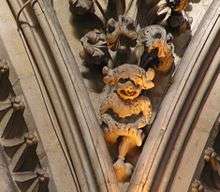Imp

An imp is a mythological being similar to a fairy or goblin, frequently described in folklore and superstition.
Etymology
The Old English noun impa meant a young shoot or scion of a plant or tree, and later came to mean the scion of a noble house, or a child in general.[1] Starting in the 16th century, it was often used in expressions like "imps of serpents", "imp of hell", "imp of the devil", and so on; and by the 17th century, it came to mean a small demon, a familiar of a witch. The Old English noun and associated verb impian appear to come from an unattested Late Latin term *emputa (impotus is attested in the Salic law), the neuter plural of Greek ἔμϕυτος 'natural, implanted, grafted'.[2]
History
Originating from Germanic folklore, the imp was a small lesser goblin. Imps were often mischievous rather than evil or harmful (goblins in Ge legend were not necessarily evil), and in some regions, they were portrayed as attendants of the gods.
Imps are often shown as small and not very attractive creatures. Their behavior is described as being wild and uncontrollable, much the same as fairies, and in some cultures, they were considered the same beings, both sharing the same sense of free spirit and enjoyment of all things fun. It was later in history that people began to associate fairies with being good and imps with being malicious and evil. However, both creatures were fond of pranks and misleading people. Most of the time, the pranks were harmless fun, but some could be upsetting and harmful, such as switching babies or leading travellers astray in places with which they were not familiar. Though imps are often thought of as being immortal, many cultures believed that they could be damaged or harmed by certain weapons and enchantments, or be kept out of people's homes by the use of wards.
Imps were often portrayed as lonely little creatures, always in search of human attention. They often used jokes and pranks as a means of attracting human friendship, which often backfired when people became tired or annoyed of the imp's endeavors, usually driving it away.
Even if the imp was successful in getting the friendship it sought, it often still played pranks and jokes on its friend, either out of boredom or simply because this was the nature of the imp. This trait gave way to using the term "impish" for someone who loves pranks and practical jokes. Being associated with hell and fire, imps take a particular pleasure from playing with temperatures.
To this end, it came to be believed that imps were the familiar spirit servants of witches and warlocks, where the little demons served as spies and informants. During the time of the witch hunts, supernatural creatures such as imps were sought out as proof of witchcraft, though often, the so-called "imp" was typically a black dog, black cat, lizard, toad, or some other form of uncommon pet.[3]
Imps have also been described as being "bound" or contained in some sort of object, such as a sword or crystal ball. In other cases, imps were simply kept in a certain object and summoned only when their masters had need of them. Some even had the ability to grant their owners wishes, much like a genie. This was the object of the 1891 story "The Bottle Imp" by Robert Louis Stevenson, which told of an imp contained in a bottle that would grant the owner their every wish, the catch being that the owner's soul would be sent to hell if he or she did not sell the bottle to a new owner before dying.

Imps can be found in art and architecture throughout the world, often hidden under the eaves of a church or the foot of a ceramic cup, so they can only be found by the most interested and observant of people. They frequently appear in children's stories, such as Silvia in which the protagonist is followed by a black imp.
See also
![]() The dictionary definition of imp at Wiktionary
The dictionary definition of imp at Wiktionary
References
- ↑
 Chisholm, Hugh, ed. (1911). "Imp". Encyclopædia Britannica (11th ed.). Cambridge University Press.
Chisholm, Hugh, ed. (1911). "Imp". Encyclopædia Britannica (11th ed.). Cambridge University Press. - ↑ Oxford English Dictionary, 1st edition, 1899, s.v. 'imp'
- ↑ William Godwin (1876). "Lives of the Necromancers". p. 17.